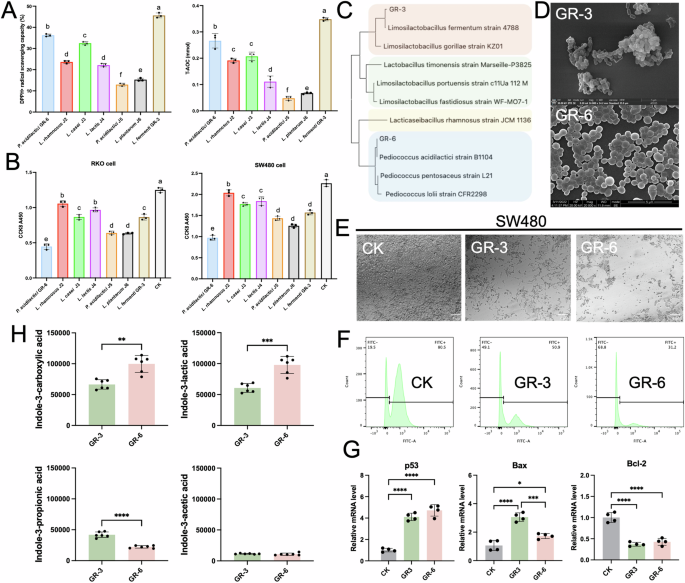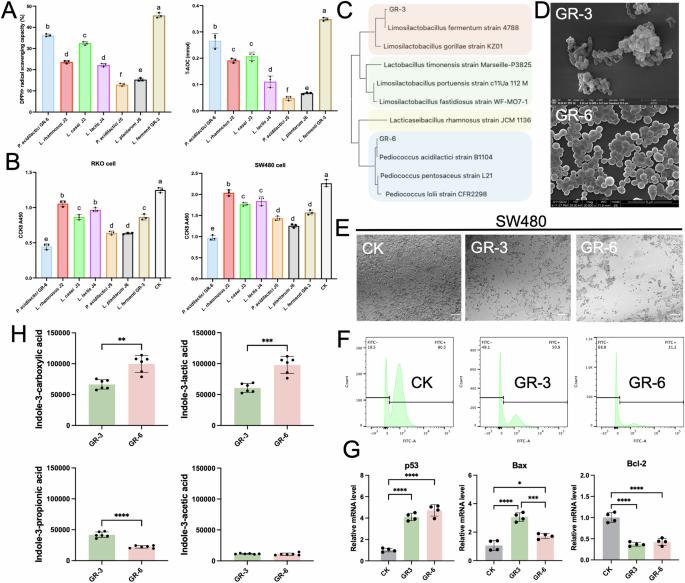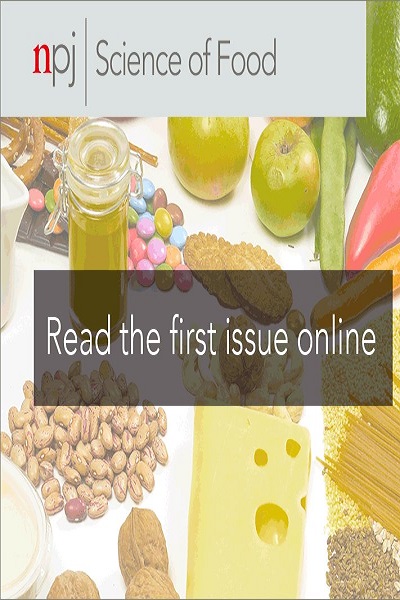益生菌 Limosilactobacillus fermentum GR-3 通过调节肠道微生物群减轻小鼠结肠炎相关肿瘤的发生
IF 6.3
1区 农林科学
Q1 FOOD SCIENCE & TECHNOLOGY
引用次数: 0
摘要
大肠癌(CRC)的细菌疗法是一个新兴的前沿领域。从传统食品 "江水 "中提取的益生菌--发酵柠檬乳杆菌 GR-3 通过产生吲哚衍生物 ICA 和 IPA,表现出卓越的抗氧化能力。在 AOM/DSS 诱导的 CRC 小鼠模型中,GR-3 可通过减少氧化应激和炎症缓解体重下降、结肠缩短、直肠出血和肠屏障破坏。GR-3在远端结肠中的定植诱导了细胞凋亡,使肿瘤发病率降低了51.2%,优于对照菌株和维生素C。GR-3对CRC的有益作用与肠道微生物组调节有关,增加了SCFA产生菌Lachnospiraceae NK4A136组,抑制了促炎菌株Bacteroides。元基因组和代谢分析表明,GR-3 的干预上调了抗氧化基因(xseA、ALDH)和丁酸合成基因(bcd),同时增加了有益代谢物(SCFAs、ICA、IPA、VB12 和 VD3),减少了有害的次级胆汁酸。总之,GR-3 是治疗 CRC 的有前途的候选药物,它能提供有效的肠道微生物组修复。本文章由计算机程序翻译,如有差异,请以英文原文为准。


A probiotic Limosilactobacillus fermentum GR-3 mitigates colitis-associated tumorigenesis in mice via modulating gut microbiome
Bacterial therapy for colorectal cancer (CRC) represents a burgeoning frontier. The probiotic Limosilactobacillus fermentum GR-3, derived from traditional food “Jiangshui”, exhibited superior antioxidant capacity by producing indole derivatives ICA and IPA. In an AOM/DSS-induced CRC mouse model, GR-3 treatment alleviated weight loss, colon shortening, rectal bleeding and intestinal barrier disruption by reducing oxidative stress and inflammation. GR-3 colonization in distant colon induced apoptosis and reduced tumor incidence by 51.2%, outperforming the control strain and vitamin C. The beneficial effect of GR-3 on CRC was associated with gut microbiome modulation, increasing SCFA producer Lachnospiraceae NK4A136 group and suppressing pro-inflammatory strain Bacteroides. Metagenomic and metabolic analyses revealed that GR-3 intervention upregulated antioxidant genes (xseA, ALDH) and butyrate synthesis gene (bcd), while increasing beneficial metabolites (SCFAs, ICA, IPA, VB12 and VD3) and reducing harmful secondary bile acids. Overall, GR-3 emerges as a promising candidate in CRC therapy, offering effective gut microbiome remediation.
求助全文
通过发布文献求助,成功后即可免费获取论文全文。
去求助
来源期刊

NPJ Science of Food
FOOD SCIENCE & TECHNOLOGY-
CiteScore
7.50
自引率
1.60%
发文量
53
期刊介绍:
npj Science of Food is an online-only and open access journal publishes high-quality, high-impact papers related to food safety, security, integrated production, processing and packaging, the changes and interactions of food components, and the influence on health and wellness properties of food. The journal will support fundamental studies that advance the science of food beyond the classic focus on processing, thereby addressing basic inquiries around food from the public and industry. It will also support research that might result in innovation of technologies and products that are public-friendly while promoting the United Nations sustainable development goals.
 求助内容:
求助内容: 应助结果提醒方式:
应助结果提醒方式:


